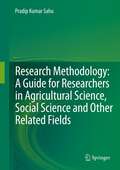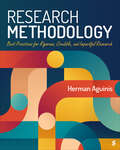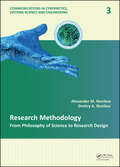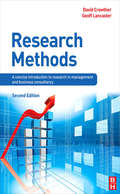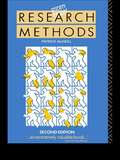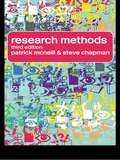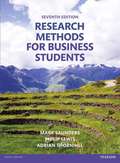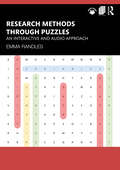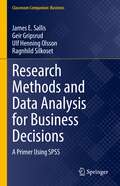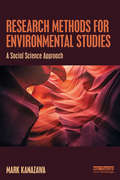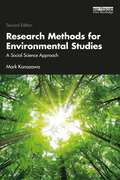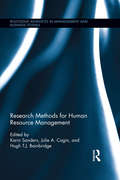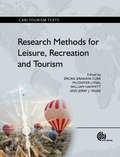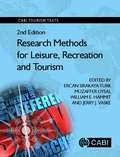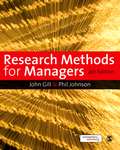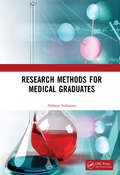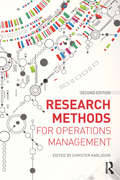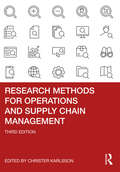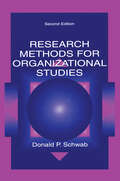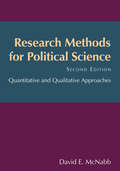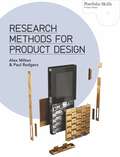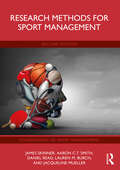- Table View
- List View
Research Methodology: A Guide for Researchers In Agricultural Science, Social Science and Other Related Fields
by Pradip Kumar SahuThis book is the outcome of more than 20 years of experience of the author in teaching and research field. The wider scope and coverage of the book will help not only the students/ researchers/professionals in the field of agriculture and allied disciplines, but also the researchers and practitioners in other fields. Written in simple and lucid language, the book would appeal to all those who are meant to be benefitted out of it. All efforts have been made to present "RESEARCH", its meaning, intention and usefulness. The book reflects current methodological techniques used in interdisciplinary research, as illustrated with many relevant worked out examples. Designing of research programme, selection of variables, collection of data and their analysis to interpret the data are discussed extensively. Statistical tools are complemented with real-life examples, making the otherwise complicated subject like statistics seem simpler. Attempts have been made to demonstrate how a user can solve the problems using simple computer-oriented programme. Emphasis is placed not only on solving the problems in various fields but also on drawing inferences from the problems. The importance of instruments and computers in research processes and statistical analyses along with their misuse/incorrect use is also discussed to make the user aware about the correct use of specific technique. In all the chapters, theories are combined with examples, and steps are enumerated to follow the correct use of the available packages like MSEXCELL, SPSS, SPAR1, SAS etc. Utmost care has been taken to present varied range of research problems along with their solutions in agriculture and allied fields which would be of immense use to readers.
Research Methodology: Best Practices for Rigorous, Credible, and Impactful Research
by Herman AguinisResearch Methodology: Best Practices for Rigorous, Credible, and Impactful Research takes a 360-degree view of understanding and doing research, helping readers become expert researchers, reviewers, and consumers of research. Renowned author, journal editor, and researcher Herman Aguinis distills the vast body of work on methodological best practices into a singular experience. Each of the 16 chapters thoroughly explains a different aspect of methodology step by step, from choosing useful and compelling research topics to reporting results accurately and credibly. Researchers at all career stages will find this text helpful to structure and conduct high-impact empirical research aimed at producing a thesis, dissertation, or journal publication. Research consumers will find instruction on how to evaluate the rigor and credibility of research conducted by others. Instructors will find the book’s modular approach refreshing by assigning students the most relevant topics—from checklists of best practices to an in-depth treatment of a methodology. Filled with "how-to’s" and "dos and don’ts", figures, hands-on exercises, and "Methods in Practice" boxes that summarize and apply best practices, this book is a must-have for anyone interested in producing or reading research. Included with this title: LMS Cartridge: Import this title’s instructor resources into your school’s learning management system (LMS) and save time. Don’t use an LMS? You can still access all of the same online resources for this title via the password-protected Instructor Resource Site. Learn more.
Research Methodology: Best Practices for Rigorous, Credible, and Impactful Research
by Herman AguinisResearch Methodology: Best Practices for Rigorous, Credible, and Impactful Research takes a 360-degree view of understanding and doing research, helping readers become expert researchers, reviewers, and consumers of research. Renowned author, journal editor, and researcher Herman Aguinis distills the vast body of work on methodological best practices into a singular experience. Each of the 16 chapters thoroughly explains a different aspect of methodology step by step, from choosing useful and compelling research topics to reporting results accurately and credibly. Researchers at all career stages will find this text helpful to structure and conduct high-impact empirical research aimed at producing a thesis, dissertation, or journal publication. Research consumers will find instruction on how to evaluate the rigor and credibility of research conducted by others. Instructors will find the book’s modular approach refreshing by assigning students the most relevant topics—from checklists of best practices to an in-depth treatment of a methodology. Filled with "how-to’s" and "dos and don’ts", figures, hands-on exercises, and "Methods in Practice" boxes that summarize and apply best practices, this book is a must-have for anyone interested in producing or reading research. Included with this title: LMS Cartridge: Import this title’s instructor resources into your school’s learning management system (LMS) and save time. Don’t use an LMS? You can still access all of the same online resources for this title via the password-protected Instructor Resource Site. Learn more.
Research Methodology: From Philosophy of Science to Research Design (Communications in Cybernetics, Systems Science and Engineering #3)
by Dmitry A. Novikov Alexander M. NovikovResearch Methodology: From Philosophy of Science to Research Design distinguishes itself from many other works devoted to research methodology and the philosophy of science in its integrated approach towards scientific research, which is regarded as the scientific project on all levels from philosophy of science to research design. This work studie
Research Methods
by David Crowther Geoff LancasterThis is the ideal companion for those needing guidance when carrying out a research project in a management or a business-related subject. The text is succinct and concise, written with modular courses in mind for the reader to quickly gain an overall perspective of the fundamental areas and identify the key points that need to be addressed. This clear and practical book also covers the requirements of more general areas of business research and consultancy. New to this edition is a chapter devoted to the analysis of qualitative data - an area many students find they want to focus on. A new accompanying student website also gives practical guidance on some of the problems students face: assistance with writing a research proposal; the structure of a dissertation; collecting data - how much is enough; citing references; links to other resources.Dissertations and projects form an integral part of many MBA and degree programmes and this text is invaluable when tackling this area for the first time. The authors approach the research task in a step-by-step manner, covering areas such as data collection, observational methods, and data analysis.
Research Methods
by Patrick McNeillThis is the second, fully revised and updated edition of a highly praised text introducing sociological research methods to the student. It is written for the non-specialist, yet introduces all the central issues of social research.
Research Methods
by Steve Chapman Patrick McNeill Patrick McneillSince its first edition in 1985, Patrick McNeill's Research Methods has become a classic introductory text for students of sociology at A level and in undergraduate courses as well as for a range of specialists in education, business, social care and medicine who need a brief but authoritative account of how sociologists set about conducting research. After a brief overview of the history of sociological research which introduces key concepts, this new edition, co-authored with Steve Chapman, describes the main sociological research methods, and includes sections on theory, science and values as well as: references to research studies developments in relevant sociological theory developments in research methodology new material on the presentation of research findings. Including an appendix of questions which students should ask when they are evaluating accounts of research, this lasting text retains the clarity of style of the second edition, and brings the content up-to-date.
Research Methods For Business Students
by Mark Saunders Philip Lewis Adrian ThornhillA comprehensive introduction to research methods in business for students planning or undertaking a dissertation or extensive research project in business and management. <P><P> The fifth edition of Research Methods for Business Students brings the theory, philosophy and techniques of research to life and enables students to understand the practical relevance of the research methods. A highly accessible style and logical structure have made this the 'student choice' and run-away market leader. <P><P> The book is written for students on undergraduate and postgraduate degree programmes in business, or business-related disciplines. <P><P> The following online resources support the text: <P><P> For Students: self-assessment questions, glossary, revision "flashcards", tutorials for SPSS and NVivo, plus Smarter Online Searching Guide For Instructors: teaching manual, powerpoint slides, testbank
Research Methods Through Puzzles: An Interactive and Audio Approach
by Emma RandlesDive into the world of research with this interactive puzzle book. Whether you're just starting out with research methods or looking to refresh your knowledge on the basics, this book offers a fun and engaging way to get to grips with everything research related. You'll explore key topics like variables, sampling methods, experimental design, reliability, and validity—plus so much more!With clear, easy-to-follow explanations, you’ll learn how to control variables, understand different types of data, develop hypotheses, ensure reliability and validity, and choose the right statistical tests. Each concept is paired with puzzles to help you consolidate what you’ve learned. And to make it even easier, each chapter has support material in the form of a helpful audio guide to walk you through the material.This book takes a conversational approach to make learning research methods feel less intimidating, and more enjoyable! Whether you're a student or just someone interested in research, this puzzle book turns learning research methods into an engaging and fun activity.
Research Methods and Data Analysis for Business Decisions: A Primer Using SPSS (Classroom Companion: Business)
by James E. Sallis Geir Gripsrud Ulf Henning Olsson Ragnhild SilkosetThis introductory textbook presents research methods and data analysis tools in non-technical language. It explains the research process and the basics of qualitative and quantitative data analysis, including procedures and methods, analysis, interpretation, and applications using hands-on data examples in QDA Miner Lite and IBM SPSS Statistics software. The book is divided into four parts that address study and research design; data collection, qualitative methods and surveys; statistical methods, including hypothesis testing, regression, cluster and factor analysis; and reporting. The intended audience is business and social science students learning scientific research methods, however, given its business context, the book will be equally useful for decision-makers in businesses and organizations.
Research Methods for Environmental Studies: A Social Science Approach
by Mark KanazawaThe methodological needs of environmental studies are unique in the breadth of research questions that can be posed, calling for a textbook that covers a broad swath of approaches to conducting research with potentially many different kinds of evidence. Written specifically for social science-based research into the environment, this book covers the best-practice research methods most commonly used to study the environment and its connections to societal and economic activities and objectives. Over five key parts, Kanazawa introduces quantitative and qualitative approaches, mixed methods, and the special requirements of interdisciplinary research, emphasizing that methodological practice should be tailored to the specific needs of the project. Within these parts, detailed coverage is provided on key topics including the identification of a research project; spatial analysis; ethnography approaches; interview technique; and ethical issues in environmental research. Drawing on a variety of extended examples to encourage problem-based learning and fully addressing the challenges associated with interdisciplinary investigation, this book will be an essential resource for students embarking on courses exploring research methods in environmental studies.
Research Methods for Environmental Studies: A Social Science Approach
by Mark KanazawaThe methodological needs of environmental studies are unique in the breadth of research questions that can be posed, calling for a textbook that covers a broad swath of approaches to conducting research with potentially many different kinds of evidence. Fully updated to address new developments such as the effects of the internet, recent trends in the use of computers, remote sensing, and large data sets, this new edition of Research Methods for Environmental Studies is written specifically for social science-based research into the environment. This revised edition contains new chapters on coding, focus groups, and an extended treatment of hypothesis testing. The textbook covers the best-practice research methods most used to study the environment and its connections to societal and economic activities and objectives. Over five key parts, Kanazawa introduces quantitative and qualitative approaches, mixed methods, and the special requirements of interdisciplinary research, emphasizing that methodological practice should be tailored to the specific needs of the project. Within these parts, detailed coverage is provided on key topics including the identification of a research project, hypothesis testing, spatial analysis, the case study method, ethnographic approaches, discourse analysis, mixed methods, survey and interview techniques, focus groups, and ethical issues in environmental research. Drawing on a variety of extended and updated examples to encourage problem-based learning and fully addressing the challenges associated with interdisciplinary investigation, this book will be an essential resource for students embarking on courses exploring research methods in environmental studies.
Research Methods for Human Resource Management: Research Methods For Human Resource Management (Routledge Advances in Management and Business Studies)
by Karin Sanders Julie A. Cogin Hugh T.J. BainbridgeSince the beginning of the century, there have been calls for the integration of traditional individualistic (micro) and management (macro) paradigms in Human Resource Management studies. In order to understand this so-called ’black box,’ the HR field needs research which is more sensitive to institutional and cultural contexts, focusing on formal and informal relationships between employees, supervisors and HR managers and the means by which these organizational participants enable and motivate one another. This book presents advanced quantitative and mixed research methods that can be used to analyze integrated macro and micro paradigms within the field of Human Resource Management. Multi actor, social network and longitudinal research practices, among others, are explored. Readers will gain insight into the advantages and disadvantages of different research methods in order to evaluate which type is most suitable to their research. This book is suitable for both advanced researchers and graduate students.
Research Methods for Leisure, Recreation and Tourism
by Muzaffer Uysal Frederic Dimanche Harmen Oppewal Sheryl Kline Jerry Vaske Kenneth Backman Yuksel Ekinci Harriet Dixon Edward Ruddell Jacinta Gau Gayle Jennings Kathleen Andereck William Hammitt Patrick Tierney Seyhmus Baloglu Ercan Sirakaya-Turk Chenchen HuangThis introductory level textbook describes fundamental elements of research methods for leisure, recreation and tourism, with contributions from internationally renowned and active researchers in the field. It covers statistical information such as measurement of variables, sampling, questionnaire design and evaluation methods, and also contains wider discussion of writing proposals, communicating research findings, cross-cultural research, and the use of new technologies in conducting research. Enhanced by illustrations, focus boxes, review questions and case studies, this text introduces undergraduate students to the vital skills they will need to succeed in tourism studies.
Research Methods for Leisure, Recreation and Tourism
by William E. Hammitt Ercan Sirakaya-Turk Jerry J. Vaske Muzaffer S. UysalDescribing the fundamental elements of research methods for leisure, recreation and tourism, this new edition of a popular textbook is updated throughout. It covers the measurement of variables, sampling, questionnaire design and evaluation methods, and also a wider discussion of writing proposals, communicating research findings, cross-cultural research, and the use of new technologies in conducting research. This new edition includes: * New and expanded material on visual research methods, non-parametric tests and sampling to encompass growing areas of research interest; * Pedagogical features and extra citations to create a cohesive learning experience for students; and * Numerous examples from tourism and recreation literature in every chapter, tying theory into scenarios students could face in their careers. Written by internationally renowned researchers in an accessible style, this book introduces both undergraduate and graduate students to the vital skills they will need to succeed in the leisure, recreation, tourism and hospitality industries.
Research Methods for Leisure, Recreation and Tourism: Management, Marketing and Sustainability (CABI Tourism Texts)
by Dr Lori Pennington-Gray Frederic Dimanche Harmen Oppewal Sheryl Kline Jerry Vaske Yuksel Ekinci Harriet Dixon Edward Ruddell Jacinta Gau Gayle Jennings Kathleen Andereck Patrick Tierney Seyhmus Baloglu Chenchen Huang Dogan Gursoy Dr Begum Aybar-Damali Dr L Brent Igo Francis A McGuire Tom Griffin Dr Ahmet UsakliPraise for the previous edition: 'To write a good textbook is only possible with pedagogic sensitivity, significant educational experiences, and research practice. This book is evidence that the editors possess all three qualifications. A student-friendly publication introducing plenty of examples and case studies (and) encouraging students to acquire the skills needed... this book (is) a winner.' Annals of Tourism Research 39(3), 2012. Describing the fundamental elements of research methods for leisure, recreation and tourism, this new edition of a popular textbook is updated throughout. It covers the measurement of variables, sampling, questionnaire design and evaluation methods, and also a wider discussion of writing proposals, communicating research findings, cross-cultural research, and the use of new technologies in conducting research. This new edition includes: - new and expanded material on visual research methods, nonparametric tests and sampling to encompass growing areas of research interest; - pedagogical features and extra citations to create a cohesive learning experience for students; and - numerous examples from tourism and recreation literature in every chapter, tying theory into scenarios students could face in their careers. Written by internationally renowned researchers in an accessible style, this book introduces both undergraduate and graduate students to the vital skills they will need to succeed in the leisure, recreation, tourism and hospitality industries.
Research Methods for Managers
by John Gill Phil Johnson Murray ClarkThird Edition of Bestselling Textbook `With its comprehensive coverage, clear, logical structure and lucid, accessible writing style, this masterful introduction to management research sets a standard others will find hard to emulate. A highly informative "must buy", I strongly recommend this text as essential reading for all engaged in research in management. ' - Peter L Jennings, University of Southampton, School of Management `John Gill and Phil Johnson have written a text which is necessary reading for management students. But it is even more necessary reading for those managers - both of the student and/or practising variety - who in their search for a coherent and hard identity have chosen to see themselves as men and women of action rather than theorisers'-Alex Weich, Westminster Business School `Gill and Johnson do a first class job of interpreting and personalising the mystique of research in business and management. The new edition of their book offers a wealth of detail encompassing all aspects of research in practice [with] real insights into the process of selecting a research approach and the practical, philosophical and methodological implications that ensue. The authors well-grounded experience shows throughout the work injecting a much needed dose of realism. The result is a well-balanced treatment of the crucial issues in management research. As I was reading through the work, I found myself challenging my own research perceptions and approaches. I personally rate it as a real gem. A must for the questioning research student (and the professional researcher)' - Darren Dalcher, Head of Software Forensics Centre, Middlesex University The new and updated Third Edition of this bestselling introductory text: - Is even more practical and easy to use for students with exercises & an up to date glossary of terms - Provides new and updated examples of management research in practice - Uses detailed examples drawn from published management research to illustrate issues and methodologies - Provides in-depth suggestions for further reading at the end of each chapter - Provides a sound basis and will continue to assist students at first degree, diploma, MBA or Doctorate level. The authors address key philosophical matters that are fundamental to any real understanding of the methodological approaches to management research. They challenge the advocacy of some methods over others, pointing out the advantages and disadvantages of different methods according to the kinds of data they afford. Research Methods for Managers enables students to take their first steps in project work, confident that they are on firm ground in their choice of methodological approaches.
Research Methods for Medical Graduates
by Abhaya IndrayanThis book discusses the why and how of each step of data-based medical research that can provide basic information to emerging researchers and medical graduate students who write theses or publish articles. The chapters are arranged in the sequence of steps for data-based research. The research steps are comprehensively covered from the selection of the topic to the final publication. Reporting methods such as CONSORT, STARD, and SAMPL guidelines are also covered. Each chapter has separately earmarked examples from the contemporary literature that illustrate the different research methods. Key Features Discusses all the steps of data-based medical research Examines the topics in depth by way of examples from contemporary literature Features notable information in boxes for special attention .
Research Methods for Operations Management
by Christer KarlssonResearch Methods for Operations Management, second edition is a toolkit of research approaches primarily for advanced students and beginner researchers but also a reference book for any researcher in OM. Many students begin their career in research limited by the one or few approaches taken by their department. The concise, accessible overviews found here equip them with an understanding of a variety of methods and how to use them, enabling them to tailor their research project to their own strengths and goals. The more seasoned researcher will find comprehensive descriptions and analyses on a wide variety of research approaches. This updated and enhanced edition responds to the latest developments in OM, including the growing prominence of services and production of intangible products, and the increasing use of secondary data and of mixed approaches. Alternative research approaches are included and explored to help with the early planning of research. This edition also includes expanded literature review and analysis to guide students towards the next steps in their reading, and more detailed step-by-step advice to tie theory with the researcher’s own practice. Including contributions from an impressive range of the field’s leading thinkers in OM research, this is a guide that no-one embarking on an OM research project should be without.
Research Methods for Operations and Supply Chain Management
by Christer KarlssonResearch Methods for Operations and Supply Chain Management, third edition, is a toolkit of research approaches primarily for advanced students and beginner researchers, but also a reference book for any researcher in operations and supply chain management (OSCM). Many students begin their careers in research limited by the one or few approaches taken by their department. The concise, accessible overviews found here equip them with an understanding of a variety of methods and how to use them, enabling students to tailor their research project to their own strengths and goals. The more seasoned researcher will find comprehensive descriptions and analyses on a wide variety of research approaches. This updated and enhanced edition responds to the latest developments in OSCM, including the growing prominence of services and production of intangible products, the complete supply chain, and the increasing use of secondary data and of mixed approaches. Alternative research approaches are included and explored to help with the planning of research. This edition also includes expanded literature reviews and analysis to guide students towards the next steps in their reading, and more detailed step-by-step advice to tie theory with the research. Including contributions from an impressive range of the field’s leading thinkers in OSCM research, this is a guide that no one embarking on an OSCM research project should be without. Previous editions of this book were published under the title Research Methods for Operations Management and Researching Operations Management.
Research Methods for Organizational Studies
by Donald P. SchwabThis revision of a best selling research methods textbook introduces social science methods as applied broadly to the study of issues that arise as part of organizational life. These include issues involving organizational participants such as managers, teachers, customers, patients and clients, and transactions within and between organizations. In this new edition, chapter 19 now focuses on describing the modeling process and outcomes. An entirely new chapter 20 now addresses challenges to modeling. It goes substantially beyond a discussion of statistical inference. It also discusses issues in interpreting variance, explained estimates, and standardized and unstandardized regression coefficients. A new capstone chapter 21 helps students recognize good research. This textbook is accompanied by an Instructor's Manual for course use.
Research Methods for Political Science: Quantitative and Qualitative Methods
by David E McNabbThoroughly updated, more concise than the previous edition, and available for the first time in paperback, "Research Methods for Political Science" is designed to help students learn what to research, why to research, and how to research. The text integrates both quantitative and qualitative approaches to research in one volume, and includes the most comprehensive coverage of qualitative methods currently available. It covers such important topics as research design, specifying research problems, designing questionnaries and writing questions, designing and carrying out qualitative research, and analyzing both quantitative and qualitative research data. Heavily illustrated, classroom tested, and exceptionally readable and engaging, the text also provides specific instructions on the use of available statistical software programs such as Excel and SPSS.
Research Methods for Product Design (Portfolio Skills)
by Paul Rodgers Alex MiltonThis book provides the reader with a comprehensive, relevant, and visually rich insight into the world of research methods specifically aimed at product designers. It includes practical case studies and tutorials that will inform, inspire and help you to conduct product design research better. Product designers need a comprehensive understanding of research methods as their day-to-day work routinely involves them observing people, asking questions, searching for information, making and testing ideas, and ultimately generating 'solutions' to 'problems'. Manifest in the design process is the act of research. Huge technological advances in information, computing and manufacturing processes also offer enormous opportunities to product designers such as the development of 'intelligent' products and services, but at the same time raise important research questions that need to be dealt with. Product designers are, in many ways, best placed to address these challenges because of the manner in which they apply their design thinking to problems. This book demonstrates in a clear, highly visual and structured fashion how research methods can support product designers and help them address the very real issues the world currently faces in the 21st century.
Research Methods for Product Design (Portfolio Skills)
by Paul Rodgers Alex MiltonThis book provides the reader with a comprehensive, relevant, and visually rich insight into the world of research methods specifically aimed at product designers. It includes practical case studies and tutorials that will inform, inspire and help you to conduct product design research better. Product designers need a comprehensive understanding of research methods as their day-to-day work routinely involves them observing people, asking questions, searching for information, making and testing ideas, and ultimately generating 'solutions' to 'problems'. Manifest in the design process is the act of research. Huge technological advances in information, computing and manufacturing processes also offer enormous opportunities to product designers such as the development of 'intelligent' products and services, but at the same time raise important research questions that need to be dealt with. Product designers are, in many ways, best placed to address these challenges because of the manner in which they apply their design thinking to problems. This book demonstrates in a clear, highly visual and structured fashion how research methods can support product designers and help them address the very real issues the world currently faces in the 21st century.
Research Methods for Sport Management (Foundations of Sport Management)
by Daniel Read James Skinner Aaron C.T. Smith Lauren M. Burch Jacqueline MuellerNow in a fully revised and updated second edition, Research Methods for Sport Management provides a complete introduction to qualitative, quantitative, and mixed methods for sport management students and practitioners. Full of real-world case studies, data, and examples, and including international perspectives throughout this book to help the reader understand the challenges of research in different social and cultural contexts, this book links theory to practice, highlighting the importance of research skills in the contemporary sport industry. This book outlines an eight-step research framework that makes the research process easy to understand and that can be followed by beginners and built upon by more advanced researchers. It covers the full research process from research design and literature review to data analysis and report writing, with a strong emphasis throughout this book on new digital, online, and social media methods. This new edition includes extended coverage of topics such as research ethics, gender in research, intersectional research, Web 3.0, data visualization, research impact, and advanced statistical techniques, and considers the differing requirements of sport-related research across the private, public, and not-for-profit sectors. With improved features to enhance teaching and learning, including a research f low chart, review questions, topical case studies, and PowerPoint slides, this is an essential textbook for any research methods course taken as part of a degree course in sport business and management, sport development, or sport marketing, and an invaluable toolkit for any managers, leaders, or analysts working in the sport industry.
